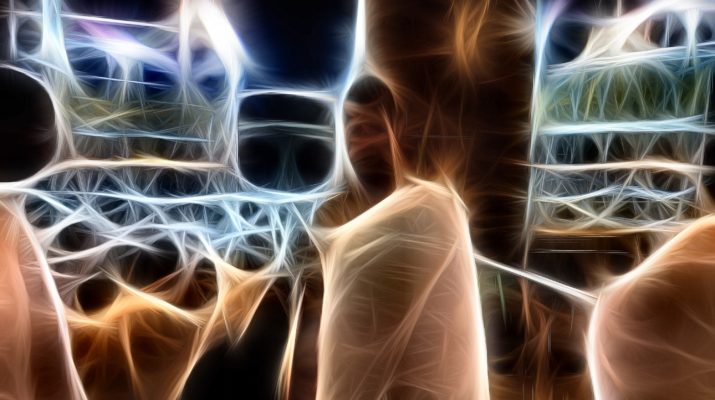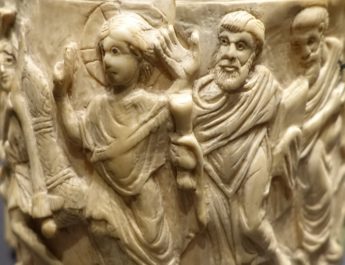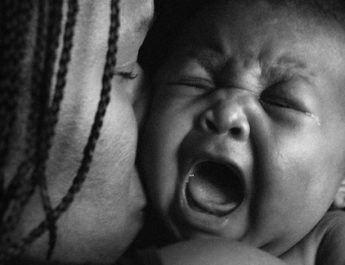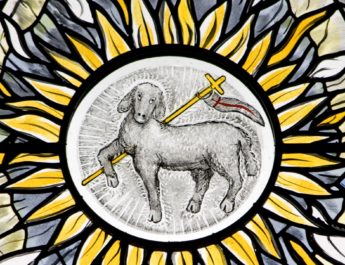Psalm 95
Third Sunday in Lent A
1 O come,A let us singB to the Lord;C
A “come” = halak. This is go, come, walk. It is walk literally and figuratively and includes people and animals. It can be used figuratively for one’s moral life – how we walk according to God’s way or against it. It can also refer to the walk of life as in the course one’s life takes, the choices we make, etc.
B “sing” = ranan. This is a cry of joy or a joyful song. Properly, it is emitting a shrill sound, especially one of joy.
C “Lord” = YHVH. From havah (to be, become) or hayah (to come to pass, become, be). This is the name of the God of Israel, the self-existent and eternal one, the tetragrammaton. This pronunciation has been lost to time so “Lord” is generally used in its place.
let us make a joyful noiseD to the rockE of our salvation!F
D “make a joyful noise” = rua. To break or destroy something so figuratively, an ear splitting sound such as a call of alarm or a joyful sound.
E “rock” = tsur. From tsur (to confine, cramp, or bind in a literal or figurative sense; to besiege, assault, or distress). This is rock, stone, cliff, boulder, rocky. It can also be a refuge, a way to refer to God.
F “salvation” = yesha. From yasha (to deliver, defend, help, preserve, rescue, be safe. Properly, to be open, wide or free, which implies being safe. Used causatively, it means to free). This is salvation, deliverance, rescue, safety, welfare, liberty.
2 Let us comeG into his presenceH with thanksgiving;I
let us make a joyful noise to him with songs of praise!J
G “come” = qadam. Perhaps from qedem (front, formerly, before, east, eternal, everlasting, antiquity). This is to come in front or be in front and so meet, anticipate, confront, receive, or rise. It sometimes means to meet for help.
H “presence” = paneh. From panah (to turn, face, appear). This is face in a literal or figurative sense. It could be face, presence, anger, respect. It can also be used of God to indicate divine favor or presence.
I “thanksgiving” = todah. From yadah (to throw one’s hands into the air in a gesture of praise, to give thanks, or make a confession); from yad (hand, ability, power; hand in a literal sense; what one can do or the means by which one does it). This is properly extending one’s hand, which implies affirmation and adoration. It can be a song of thanksgiving, a choir of thanksgiving, confession, or praise. It can also be a thank offering.
J “songs of praise” = zamir. 7x in OT. From zamar (making music; used specially of music to worship God; music with singing, singing praise, singing psalms); may be from zamar (to trim or prune). This is a song, psalm, or other music accompanied with instruments.
3 For the Lord is a greatK God,L
and a great KingM above allN gods.O
K “great” = gadol. From gadal (to grow up, become great, become wealthy – to advance. The root meaning may be to twist in the sense of the process of growing). This is great, high, bigger, noble, old, marvelous. It can also refer to someone who is powerful or distinguished.
L “God” = El.
M “King” = melek. From malak (to be or become king or queen, to rise to the throne, to be crowned; by implication, to take counsel). This is king or royal.
N “all” = kol. From kalal (to complete). This is all or every.
O “gods” = elohim. Related to “God” in v3. See note L above.
4 In his handP are the depthsQ of the earth;R
the heightsS of the mountainsT are his also.
P “hand” = yad. Related to “thanksgiving” in v2. See note I above.
Q “depths” = mechqar. 1x in OT. From chaqar (to penetrate; so, to thoroughly investigate, examine, ponder, or seek out). This is a range, depth, recess. It can also mean something scrutinized.
R “earth” = erets. Root may mean to be firm. This is earth, ground, field land, or country.
S “heights” = toaphah. 4x in OT. Perhaps from ya’aph (to be faint, tire, be weary). This is peak, horn, eminence. It ca also imply toil and therefore that which one gains from toil – a good, strength.
T “mountains” = har. From harar (hill or mountain). This is mountain, hill, hilly region.
5 The seaU is his, for he madeV it,
and the dry land,W which his hands have formed.X
U “sea” = yam. Root may mean to roar. This is the sea, often referring to the Mediterranean. It comes from the root in the sense of the roar of crashing surf. This word is sometimes used for rivers or other sources of water. It can mean to the west or to the south.
V “made” = asah. This is to make, do, act, appoint, become in many senses.
W “dry land” = yabbesheth. 2x in OT. From yabbashah (dry land dry ground); yabesh (to dry up, be withered, be dry; to be ashamed, confused, or disappointed). This is dry land or dry ground.
X “formed” = yatsar. Perhaps related to yatsar (to be narrow, distressed, or vexed); perhaps related to tsarar (to bind, restrict, narrow, be cramped, an adversary). This is to fashion or form, perhaps by squeezing something into a shape or form. Particularly, it is to create as a potter does. Figuratively, it is to determine.
6 O come,Y let us worshipZ and bow down,AA
let us kneelBB beforeCC the Lord, our Maker!DD
Y “come” = bo. This is to enter, come in, advance, fulfill, bring offerings, enter to worship, attack. It can also have a sexual connotation.
Z “worship” = shachah. This is to bow down, make a humble entreaty, to do homage to royalty or to God.
AA “bow down” = kara. This is to bow, crouch, kneel down, subdue. It is to bend the knee in many senses. It can also mean to smite, a woman crouching in childbirth, or bowing to worship God.
BB “kneel” = barak. This is to kneel, to bless. It is blessing God as part of worship and adoration or blessing humans to help them. It can be used as a euphemism to say curse God.
CC “before” = paneh. Same as “presence” in v2. See note H above.
DD “Maker” = asah. Same as “made” in v5. See note V above.
7 For he is our God,EE
and we are the peopleFF of his pasture,GG
and the sheepHH of his hand.
EE “God” = Elohim. Same as “gods” in v3. See note O above.
FF “people” = am. From amam (to darken, hide, associate; creating shadows by huddling together). This is people or nation. It can be used specifically for a tribe, collectively of troops or armies, or figuratively to refer to a flock of animals.
GG “pasture” = marith. 10x in OT. From raah (to graze, tend a flock, keep company with; to pasture in a literal or figurative sense). This is shepherding, pasturage, a flock.
HH “sheep” = tson. This is a flock of sheep and goats.
O that todayII you would listen toJJ his voice!KK
II “today” = yom. Root may mean being hot. This is the day in a literal or figurative sense. It can also mean birth, age, daylight, continually or other references to time.
JJ “listen to” = shama. This is to hear, call, consent, or consider. It implies listening intelligently, giving attention, and, because of these two factors, obedience and action are often implied.
KK “voice” = qol. This is a sound, used often for human voices. Also used when God speaks or angels, animals or instruments. It can be a cry or a noise, thunder or earthquakes and so on.
8 Do not hardenLL your hearts,MM as at Meribah,NN
as on the day at MassahOO in the wilderness,PP
LL “harden” = qashah. This is to be fierce, cruel, dense, tough, severe.
MM “hearts” = lebab. May be related to labab (to encourage; properly, to be encased as with fat; used in a good sense, this means to transport someone with love; used in a bad sense, it can mean to dull one’s senses). This is the heart, courage, one’s inner self, the mind, or the will. Heart is only used in a figurative sense in the Old and New Testaments.
NN “Meribah” = Meribah. 7x in OT. From the same as meribah (strife, quarrel); from rib (properly to toss or grapple; used figuratively to mean wrangling and so for arguments, complaints, or disputes; used in a legal setting for pleading or defending a case). This is Meribah, a place whose name means “strife.”
OO “Massah” = Massah. 5x in OT. From nasah (to test, prove, try, tempt, or attempt). This is testing, trial, calamity, despair. It can be used of human trials or God’s testing. It can also be Massah.
PP “wilderness” = midbar. From dabar (to speak, command, declare). This is mouth or speech. It can also be desert or wilderness. Additionally, it can be used for a pasture to which one drives cattle.
9 when your ancestorsQQ testedRR me,
and put me to the proof,SS though they had seenTT my work.UU
QQ “ancestors” = ab. This is father, chief, or ancestor. It is father in a literal or figurative sense.
RR “tested” = nasah. Related to “Massah” in v8. See note OO above.
SS “put…to the proof” = bachan. This is to examine, test, or prove – as one tests metals. It can also be used literally or figuratively for investigating or trying.
TT “seen” = raah. This is to see in a literal or figurative sense so stare, advise, think, view.
UU “work” = poal. From paal (to do, make, work, or accomplish; generally refers to regularly repeated or systematic action – to practice). This is an action or deed, conduct. It is the act of working or the work itself. It can also be wages or maker.
10 For fortyVV yearsWW I loathedXX that generationYY
VV “forty” = arbaim. From the same as arba (four); from raba (to make square or be four-sided); perhaps from raba (to lie down flat; can be to lie for mating). This is forty.
WW “years” = shanah. From shana (to change, alter). This is a year, age, old. It can also mean yearly.
XX “loathed” = quwt. 6x in OT. This is to cut off, be grieved. Figuratively, it is to detest.
YY “generation” = dor. From dur (to move in a circle, which implies living somewhere or remaining there; it can also be the sense of piling or heaping up). This is a revolution of time, which is to say, an age or generation. It can also be a dwelling or one’s posterity.
and said, “They are a people whose hearts go astray,ZZ
and they do not regardAAA my ways.”BBB
ZZ “go astray” = taah. This is to wander, deceive, seduce, vacillate. It is to stray in a literal or figurative sense.
AAA “regard” = yada. This is to know, acknowledge, advise, answer, be aware, be acquainted with. Properly, this is to figure something out by seeing. It includes ideas of observation, recognition, and care about something. It can be used causatively for instruction, designation, and punishment.
BBB “ways” = derek. From darak (to tread, march, to walk. Can also mean affixing a string to a box since one needs to step on it to bend it in the process; so also an archer). This is a road as a thing that is walked on. Can be used figuratively for the path that one’s life takes or how one chooses to live one’s life.
11 Therefore in my angerCCC I swore,DDD
“They shall not enterEEE my rest.”FFF
CCC “anger” = aph. From anaph (to be angry; properly, breathing hard as a signifier of being enraged). This properly refers to the nose or nostril and by extension the face. It can specifically refer to anger or wrath as one breathes hard and nostrils flare in times of great anger.
DDD “swore” = shaba. Perhaps from sheba (seven – the number of perfection/sacred fullness). This is to swear, curse, vow, make a covenant. Properly, it can mean to be complete. This is to seven oneself – as in affirming something so strongly it is as though it were said seven times.
EEE “enter” = bo. Same as “come” in v6. See note Y above.
FFF “rest” = menuchah. From manoach (resting place, quiet, home); from nuach (to rest, calm, camp, free, place, remain, satisfy, settle, station, or wait; implies settling down in a literal or figurative sense). This is resting place, consolation, ease, quiet. It is the same word in Psalm 23:2, “he leads me beside the still waters.”
Image credit: “A GATHERING OF THE FAITHFUL …” by Bill Strain, 2008.




